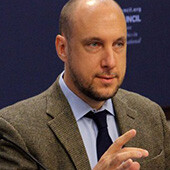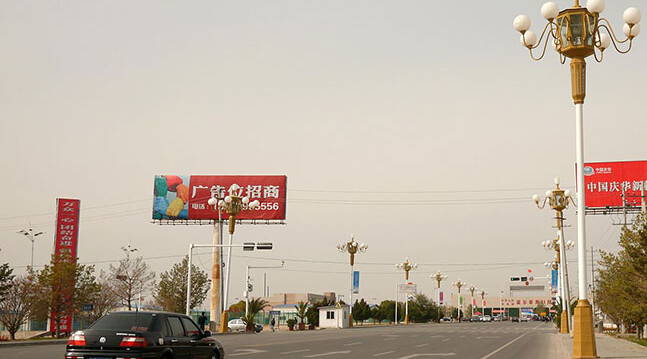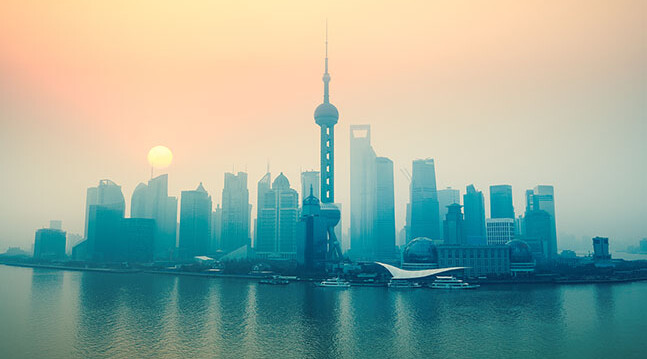According to a recent Amnesty International Report, Uyghurs, Kazakhs, and other predominantly Muslim ethnic groups in China's Xinjiang Autonomous Region are the targets of surveillance, arbitrary detention, and forced indoctrination by the Chinese government. Up to 1 million Uyghurs have been detained, says Amnesty's Francisco Bencosme. There are parallels with the Rohingya crisis, yet there has been far less international outcry.
Podcast music: Blindhead and Mick Lexington.
DEVIN STEWART: Hi, I'm Devin Stewart here at Carnegie Council in New York City, and today I'm speaking with Francisco Bencosme. He is Asia Pacific advocacy manager at Amnesty International USA.
Francisco, thank you very much for coming by today.
FRANCISCO BENCOSME: Thank you so much for having me. It's an honor to be here.
DEVIN STEWART: Today we're talking about Amnesty's new report on a very important topic. The report is titled, "China: 'Where are They': Time for Answers about Mass Detentions in the Xinjiang Uyghur Autonomous Region." What is the takeaway from this report from Amnesty today?
FRANCISCO BENCOSME: We launched this report a couple of days ago on September 24, and the big takeaway is that the international community, in particular China, should release all of the detainees who have been taken into these so-called "reeducation camps" without any trials, without any notifications to their families, and in contravention of international human rights laws. They should be released back to their families.
DEVIN STEWART: In Xinjiang.
FRANCISCO BENCOSME: Correct, and that the world should pay attention to this.
DEVIN STEWART: For people unfamiliar with this important subject, give us some context here. This is not a province; it's an "autonomous region," first of all. That's an important distinction. It's in Western China. It has a lot of Muslim Uyghurs.
FRANCISCO BENCOSME: Uyghurs, and some of the people we interview are Uyghurs, Kazakhs, and other ethnic minorities as part of this project. I believe we interviewed over 100 different folks for this report.
Like you said, it's in Northwest China. Xinjiang is an important geostrategic point for China because it's the gateway for its very important project, One Belt, One Road.
DEVIN STEWART: How does it fit into that project?
FRANCISCO BENCOSME: We talk about that briefly in the report, but according to Chinese statements and government officials they say that stability and harmony and unity are important in Xinjiang in order to continue to realize the Chinese dream of One Belt, One Road.
DEVIN STEWART: So they mean stability, essentially.
FRANCISCO BENCOSME: Exactly. It's within that narrative because of counterterrorism reasons and any concerns of so-called "separatism" they've justified some of these policies and they've justified the surveillance and technology that you've seen in Xinjiang.
DEVIN STEWART: The Social Credit and surveillance and all that type of stuff.
Give us a sense of the numbers here as well. Your report interviewed at least 100 people. About how long was the study conducted? How long were the people on the ground? How long did it take to come out with this report?
FRANCISCO BENCOSME: We worked with two non-governmental organizations (NGOs) on the ground who document Kazakhs who have had their families separated. We've interviewed folks I believe in three different continents, some in Australia, but primarily most of them in Central Asia and I believe in one other continent as well, probably somewhere else in the Middle East as well.
This study was done a couple of months ago. It complements an ever-growing body of literature and reports and journalism that have been focusing on this for the past year, even though it's important to note two things. One is that the Chinese authorities have not given access to any independent investigation, any UN fact-finding mission, any human right groups to credibly assess these so-called "reeducation camps," which makes access to information extremely difficult. Any journalists who do go to Xinjiang are often harassed by the Chinese government and followed everywhere that they go. When there are government delegations, it's very managed and controlled by the Chinese government, and so you very much see only what they want you to see. There are no ifs and buts about it. That's the first point.
The second is just that obviously there have been ethnic tensions with the Uyghurs for a long time. That predates this year. There has been cultural and religious suppression by the Chinese government, particularly in Xinjiang, but what you've seen in this past year is a massive acceleration and the widespread nature of what's going on here.
Going back to your original question, there have been reports of up to 1 million Uyghurs who have been detained or sent to these so-called political "reeducation camps," and their families are left not knowing where they are. A lot of the interviews were outside of China. They used to be in constant touch with their families in Xinjiang, and they've lost touch completely with them.
DEVIN STEWART: That million figure, does that include Uyghurs as well as Kazakhs and other Muslims?
FRANCISCO BENCOSME: Correct, yes.
DEVIN STEWART: How long has China been conducting this type of so-called "reeducation" system or these camps? I'd also like to get into the nomenclature of "camp" because there has been some debate on social media about what's the proper word.
FRANCISCO BENCOSME: We've heard reports of this going back to 2014 in terms of the creation of these camps. The Chinese government call them "technical institutes," if you will, but through satellite imagery, through interviewees, folks, some who have actually already left those camps as well, there has been a massive acceleration in growth that we've seen and been able to document this past year. So that's part of the reason why we came out with this report.
DEVIN STEWART: We could talk about why 2014. Do you have a sense of why it started then?
FRANCISCO BENCOSME: One of the things that we note in the report, it's always hard to ascribe motivation, particularly to an opaque society that the Chinese government runs under. A very influential Party secretary was reassigned from Tibet into Xinjiang, and he was very much known for using surveillance tactics, using cultural and religious suppression tactics in Tibet as has been reported, and to then see his reassignment to Xinjiang and then see a lot of this acceleration take place all within the same timeframe is a pretty good indicator for why this is going on, or at least one of the many motivators.
DEVIN STEWART: Your report uses a variety of ways to describe these "camps," if you will. You've called them "mass detention." You've also called them "arbitrary detention facilities" and "reeducation camps." There has been some debate on Twitter and elsewhere about what is the precise word. I think other phrases that have come up are "brainwashing camps," "concentration camps," and "gulags." Personally, I favor "gulag" because I think it's pithy and precise.
Was there some internal debate at Amnesty about what type of phrase to use to describe this thing, and then why did you come to the conclusion that you came to?
FRANCISCO BENCOSME: I think part of it gets back to the fact that Amnesty International hasn't had access to these camps, and so while we've been documenting from folks who have left or folks who have had family who have disappeared into these camps, without actually being able to investigate it ourselves we haven't been able to make an official naming of what we call "reeducation camps."
The other problem is that a lot of this nomenclature isn't defined under international law, and so all we know is that a lot of these Uyghurs are being detained. In some cases there have been reports of torture. We highlight one case where the person had a hood put over him, an iron bar put to his legs, and he was forced to stand for a long period of time, very similar to things that you have seen in, for example, North Korean camps as well.
There was a debate, and we ultimately decided to go with so-called "reeducation camps." I add the "so-called" because obviously while I'm sure there is Chinese indoctrination going on in the camps their main purpose is not educating them.
DEVIN STEWART: Do we know other techniques or tactics that are used within these facilities?
FRANCISCO BENCOSME: Yes. In some of the interviews, besides torture, besides taking long teachings and classes of Chinese Communist Party doctrine and history, there were signs of lack of socialization. There is deprivation of obviously contact to the outside world during this time. Language education was a really important component, particularly Mandarin and Han cultures. All of these fall in through what we think of as an attempt to suppress Uyghur cultures and in some cases religious practices as well.
DEVIN STEWART: Is there a sense of why the Chinese government has decided to target Muslims? Is there something inherent to Islam that strikes the Chinese government as threatening?
FRANCISCO BENCOSME: Again, this is something that has been going on for a long time. The Chinese government would argue that in the past there have been cases of terrorism and cases of separatism.
What the report highlights—and particularly with a prisoner of conscience that Amnesty has advocated for, Ilham Tohti—is that a lot of these human rights defenders are peaceful activists who are trying to improve their own societies and communities. Particularly, Ilham Tohti was an academic, a blogger of social justice activism and never promoted anything but peaceful forms of activism and was highlighting the ethnic suppression by the Chinese government or the mistrust between the Uyghur communities and the Chinese government, and then all of a sudden he was sentenced to life in prison.
DEVIN STEWART: At one of these centers?
FRANCISCO BENCOSME: No, this was pre-centers. This was a couple of years ago, 2014 actually.
He was just sentenced to a regular prison camp. His family doesn't know much about him, and there has not been a fair judicial process. The charges that were brought against him were of separatism, even though he never advocated that in any of his writing, nor could they provide any evidence of it.
DEVIN STEWART: What would you say the state of awareness about this is around the world? I recall that the U.S. government has finally brought this up. What do you make of the awareness? Do you think it warrants more alarm?
FRANCISCO BENCOSME: It definitely warrants more alarm. You have a country that is growing economically, militarily, and politically. The Chinese government is going to play an important role in any future discussion, and here you have a segment of its society which for no reason other than they look different or it has identified them as a threat is rounding up millions of its own citizens.
Yes, the U.S. government, and particularly Vice President Pence and Secretary Pompeo, have raised the [issue of] Uyghur Muslims and particularly in the context of religious freedom, but there's no action that has followed that. The U.S. policy hasn't raised this in some of the public forums or meetings that it has gone to. We haven't seen any cases in which it has asked for the specific whereabouts of some of these families. In terms of actual implementation and follow-through on a lot of its statements, I think the U.S. government is very lacking.
I think what's also concerning is that you're seeing a lot of countries that even have some of their own Uyghur citizens losing touch with families, or in some cases the Chinese government has asked for them to be sent back to China. There has been almost no outcry. There has been no public condemnation of the Chinese government, with some exceptions. You would think if this was in any other country, you would see a lot more alarm bells go off. So there should be absolutely more outcry over this.
DEVIN STEWART: Does the U.S. government really have leverage in this issue?
FRANCISCO BENCOSME: I think the U.S. government has the ability to convene the international community. Particularly it should really focus on other Muslim countries to really try to galvanize a concerted effort to raise this issue.
DEVIN STEWART: Are other Muslim countries getting involved?
FRANCISCO BENCOSME: We've seen senior officials in the Pakistan government raise this issue to Chinese government officials during the most recent visit. You saw Kazakhstan raise it somewhat during the most recent visit. You saw Malaysia, Ibrahim raise it in his public remarks, I think with a media appearance.
But there still needs to be a lot more done. There are still a lot of countries that have remained silent when clearly this is going to be an issue that won't go away. It's a very dangerous precedent for how China views human rights abuses and its international commitments.
DEVIN STEWART: Are people making any comparisons with the Rohingya in Burma?
FRANCISCO BENCOSME: They definitely are. Actually, this week the U.S. House of Representatives had two hearings, one at the full committee on the Rohingya, and later that evening they had a full hearing on the China Uyghurs. Members of Congress who attended both hearings very much made the parallels.
Going back to your previous point, you've seen the international community condemn what's going on in Rakhine State, what's happening to the Rohingya, and is reporting them through humanitarian assistance in Bangladesh, but as members of Congress pointed out, you've seen almost a muted response in the context of Uyghur Muslims.
I think the world is just starting to realize the full extent of what's going on in Xinjiang, but again not only does there need to be more alarm and education—and that's part of why Amnesty put out this report—but there also needs to be action and follow-through in raising these issues and calling for actual investigations and access to actually find out what's going on.
DEVIN STEWART: Francisco, thank you so much. Before we go, maybe you want to talk a little bit about what Amnesty is going to do going forward and how people can help out or get involved.
FRANCISCO BENCOSME: Absolutely. As you all know, Amnesty is a grassroots organization. We have millions of members worldwide.
One thing that we did with the launch of this report is that we have put up a petition online, amnestyusa.org, where hopefully some of your members or listeners can sign that petition that calls on the Chinese government to close these camps and release many of these Uyghurs and Kazakhs and ethnic minorities from these camps. I think that's a way for average people to be a part of this movement and tell the Chinese government.
DEVIN STEWART: Francisco Bencosme of Amnesty International USA, thank you so much for coming today.
FRANCISCO BENCOSME: Thank you for having me, Devin.



